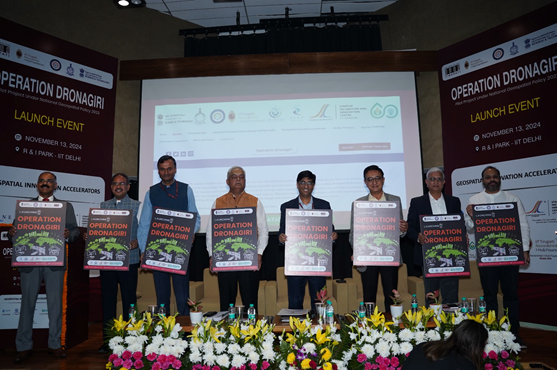Secretary Department of Science and Technology, Professor Abhay Karandikar launched the Operation Dronagiri, a pilot project under National Geospatial Policy 2022 to demonstrate the potential applications of geospatial technologies and innovations in improving the quality of life of citizens and ease of doing business, at Foundation for Innovation and Technology Transfer (FITT), Indian Institute of Technology Delhi, New Delhi on 13 November, 2024.
In his keynote address, Professor Karandikar highlighted that the Operation Dronagiri is part of the numerous efforts of DST in liberalising geospatial data, developing geospatial infrastructure, geospatial skill and knowledge as well as standards in implementing the policy.
“In the first phase, Operation Dronagiri will be implemented in the states of Uttar Pradesh, Haryana, Assam, Andhra Pradesh & Maharashtra, where pilot projects will be run and use cases will be demonstrated to showcase the potential applications of integration of geospatial data and technology in 3 sectors --Agriculture, Livelihoods, Logistics and Transport. Several Government departments, Industry, Corporate and Startups will be partnered with in the first phase. This will create the base for its Nationwide roll out,” he pointed out.
Professor Karandikar emphasised that Operation Dronagiri gains a powerful backbone with support from Integrated Geospatial Data Sharing Interface (GDI), also unveiled today, that will make spatial data accessible, bringing transformation similar to the process in which UPI has brought about financial inclusion.
The Integrated Geospatial Data Sharing Interface (GDI) enables seamless data sharing, access, and analysis for urban planning, environmental monitoring, disaster management, and more. Built with advanced data exchange protocols and privacy-preserving features, it empowers organisations to make data-driven decisions for the public good, fostering innovation and responsible use of geospatial data.
GDI offers tools to unlock actionable insights and drive collaboration. It enables efficient data processing, analysis, and sharing among stakeholders. This collaboration ensures faster, more coordinated responses in areas like infrastructure monitoring, disaster relief, and environmental protection.
“A nationwide rollout is envisioned under a PPP model, with a similar approach to UPI's deployment. Industry and private sector engagement will be pivotal in supporting this transformation in the geospatial sector,” Professor Karandikar pointed out.
Dr. Srikant Sastri, Chairman Geospatial Data Promotion and Development Committee (GDPDC) said that Operation Dronagiri represents a crucial step within the National Geospatial Policy, designed to position India as a global leader in geospatial technology. He stressed the role of the private sector and startups in making geospatial data accessible and impactful. Operation Dronagiri’s focus is on turning data into actionable solutions that bring real, socioeconomic benefits on the ground.
Shri Hitesh Kumar S. Makwana, Surveyor General of India highlighted the National Geospatial Policy 2022 plan and said that lots of efforts have been made by DST to implement the policy, while Prof. K N Satyanarayana, Director, IIT Tirupati described the role of Technology Innovation Hubs (TIHs) in accelerating geospatial innovation.
A Grand Challenge was also announced in which startups will be selected and supported in developing Proofs of Concept (POCs) that address specific problems within the designated sectors. The initiative executed through geospatial innovation accelerators will provide a platform for both early-stage and growth-stage startups, offering them mentorship, resources, and access to geospatial datasets, fostering their potential to contribute meaningfully to India's thriving geospatial ecosystem.
The activities under Operation Dranagiri will be overseen by IIT Tirupati Navavishkar I-Hub Foundation (IITTNiF). The Geospatial Innovation Accelerators (GIAs) at IIT Kanpur, IIT Bombay, IIM Calcutta and IIT Ropar will act as the operational arms of Operation Dronagiri. The entire implementation process will be driven by Geospatial Innovation Cell, Department of Science and Technology.































